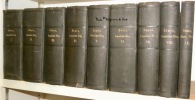4 books for « dio cassius »Edit
-
Countries
Denmark (1)
Italy (2)
Switzerland (1)
KASSIOU DIONOS ROMAIKES HISTORIAS TA TELEUTAIA BIBLIA TRIA EURISKOMENA KAI APOKATHISTAMENA. CASSII DIONIS ROMANAE HISTORIAE ULTIMI LIBRI TRES REPERTI RESTITUTIQUE.
Studio ac labore Nic. Carminii Falconis, presbyteri. In utroque Jure, & in Sacra Theologia Doctoris, & Protonotarii Apostolici. ex Typographia Chracas, Romae, 1724. In-8 (mm. 240x177), mz. pergamena antica, pp. XXVIII,186, con marca tipografica silogr. al frontespizio (palma con motto su nastro: Non possum deserere dulcedinem meam. Testo su due colonne, greco e latino. Antica firma di possesso al frontespizio; fioriture intercalate nel testo, ma complessivamente buon esemplare.
HISTORIAE ROMANAE QUAE SUPERSUNT.
Cum annotationibus Henrici Valesii, Ioannis Alberti Fabricii... Hermannus Samuel Reimarus. sumptibus Christiani Heroldi, Hamburgi, 1750-1752. In folio (mm. 410x250), 2 volumi, p. pergam. coeva, titolo oro su tassello al dorso, tagli rossi, pp. (2),XXIX,767; (6),1708 (numeraz. continua); titolo in rosso e nero, testo su due colonne (in greco e in latino), con 2 belliss. ritratti inc. in rame: 1 di Ioannes Albertus Fabricius e 1 di Hermannus Samuel Reimarus; alla dedica (al Cardinale Angelo Maria Quirino) una stupenda testata con l'effige del Cardinale su uno sfondo architettonico e con figure allegoriche, pure inc. in rame.<br>- Nel vol. I sono contenuti: "Quod complectitur Fragmenta librorum I-XXV, cum annotationibus maxime Henrici Valesii - Libros XXXVI-LIV integros, cum annotationibus Ioannis Alberti Fabricii ac paucis aliorum graeca ex codicibus mss. et fragmentis supplevit, emendavit, latinam versionem Xylandro-Leunclavianam limavit, varias lectiones notas doctorum et suas cum apparatu et indicibus adiecit Hermannus Samuel Reimarus".<br>- Nel vol. II: "Quod complectitur libros Dionis LV-LX. Passim mutilos et breviatos cum annotationibus Ioannis Alberti Fabricii - Et nonnullis aliorum libros item Dionis LXI-LXXX. Ex compendio Io. Xiphilini. Cum annotationibus Hermanni Samuelis Reimari.. cum indice graeco et latino adiunxit".<br>Cfr. Brunet,II,712: "Edition la plus belle, la plus complète et la meilleure que l'on ait dans ce format" - Graesse,II,393.<br>"Cassio Dione Cocceiano, storico greco di Roma (nato a Nicea, Bitinia, prima del 163, morto dopo il 229). Della sua grande "Storia romana" in 80 libri, divisi in decadi - dall'arrivo di Enea nel Lazio sino al 229 d.C., anno del secondo consolato dell'autore - sono giunti a noi 25 libri (36°-60°) dal 69 a.C. al 47 d.C.; parte dei libri 78° e 79° (216-219 d.C.); estratti in florilegi bizantini; oltre al compendio di G. Xifilino dell'XI secolo e di Zonara del secolo seguente". Cosi' Diz. Treccani,IV, p. 71.Con uniformi lievi arross. o lievi fiorit., ma complessivam. esemplare ben conservato.
Historiarum Romanarum quae Supersunt. Graeca ex Codicibus Mss. Aliisque Subsidiis Supplevit et Emendavit Xiphilini Epitomen Librorum Dionis Cassi Aeque Emendatam Addidit Latina Versio ut Graecis Verbis Magis Responderet Operam Dedit Fragmenta et Indicem Graecum Valde Auxit Annotationes ex Editione Reimariana Omnes Repetiit Multasque tam Ioh. Iac. Reiskii et Aliorum quam suas Notas Adiecit Friidericus Guilielmus Sturzius. 9 Bände.
Lipsiae - Leipzig, Libraria Kuehniana 1824-1836, 217x125mm, Halbperkalin. Goldener Titel auf der Rückseite. Guter Zustand.
Pour un paiement via PayPal, veuillez nous en faire la demande et nous vous enverrons une facture PayPal
Romaikon Istorion ta Sozomena (Greek) Historiae Romanae qvae supersunt. 2 vols. (I. Fragmenta librorum I-XXXV cum Annotationibus Henrici Valesii. Libros XXXVI-LIV Integros cum Annotationibus Ioannis Albert Fabricii - II. Libros Dionis LV-LX...Cum Anno...
Hamburg, Christian Heroldus, 1750-52. Fol. (40x26,5 cm.). Bound in 2 fine contemp. full calf. Richly gilt backs divided in 7 compartments by raised bands. Title-and tomelabels in leather. A few scratches to covers, one corner a bit bumped. A small stamp on titles. 2 fine engraved portraits (A. Fabricius and Reimar), one half-page engraved vignette. (2),XXX,767,(1)"(4),(769-)1709 pp. Printed on good paper, clean and fine. Greek-Latin text in double-columns.
Dio Cassius' Roman History from the beginnings to 229 A.D., took ten years to prepare and 12 years to write. It is annalistic in arrangement, although modified to meet requirements of subject-matter, concentrating on political aspects (he was himself praetor and consul suffectus), in the manner of Thucydides, giving a rhetorical narrative in Attic style. (Based on Oxford Classical Dict.).A beautifully printed work, ""One of the most splendid and truly critical editions (the offered item) which were ever published in Germany. It was begun by the famous Fabricius, whose notes extend from the 35th to the 60th book. On the death of that great man, Reimar, his son-in-law, completed the edition" and in respect to editorial care, diligence, and correctness, and the acquisition of valuable materials for the compilation of it, nothing can exceed the present most admirable performance. All the former publications on Dion Cassious were carefully inspected some excellent MSS. and fragments were procured and collected".. Harwood calls this admirable work ""one of the most correct and valuable Greek books ever published: the notes contain a treasure of erudition""."" (Dibdin I:506). - Graesse II: p. 393. - Brunet II: p. 712: ""Edit. la plus belle, la plus complète et le meilleure que l'on ait dans ce format.""
 Write to the booksellers
Write to the booksellers




